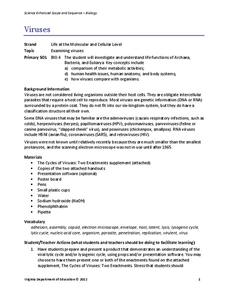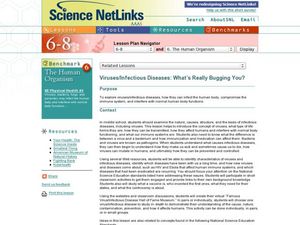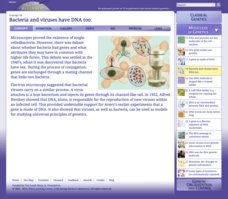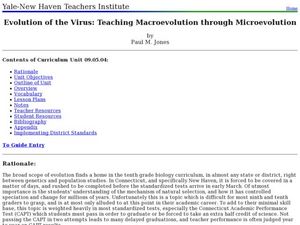Curated OER
Viruses and Bacteria
A series of questions about archaebacteria and eubacteria reinforce a chapter on viruses and bacteria. This worksheet is from chapter 18 of an unspecified textbook, but could work with your biology lecture as well. High schoolers...
Virginia Department of Education
Viruses
Germs, parasites, and viruses, oh my! Facilitate a lesson on viruses as individuals explore functions of Archaea, Bacteria, and Eukarya. They learn how viruses compare with other organisms in nature and how they contribute to health...
Curated OER
Introductory Bacteria and Virus Worksheet
Compare and contrast eukaryotes, prokaryotes, and viruses with a chart and a Venn diagram. Beginning microbiologists consider motility, reproductive ability, DNA content, and the presence of organelles. They write short answers to...
Biology Junction
Viruses, Viroids, and Prions
Are viruses living or non-living? According to the presentation, they are both and neither. Clearly, this requires clarification and an in-depth look at viruses, viroids, and prions. Young scientists learn about the history, structure,...
Howard Hughes Medical Institute
Virus Explorer
Most pupils know about the flu, HIV, and other viruses, but they don't know what each actually looks like. This interactive shows their relative size, structure, and allows for comparisons. It stresses the similarities and differences...
Curated OER
Viruses and Bacteria
Reviewing the key terms and ideas from a chapter about viruses and bacteria, this activity helps students to reinforce their knowledge about the makeup and life cycle of a virus. Students answer true/false questions, blanks from a word...
Curated OER
Virus and Bacteria Worksheet
In this viruses and bacteria worksheet, learners circle all the places that viruses and bacteria can hide in a picture of a classroom. Students do this for 1 picture.
Curated OER
Viruses and Bacteria
In this viruses and bacteria worksheet, students will read information comparing the characteristics of bacteria and viruses. Then students will match 8 statements as either describing a virus or a bacteria.
Exploratorium
Salty Pits
Yuck, does my deodorant kill that? To test whether deodorant is anti-bacterial, class members use petri dishes to grow control bacteria and bacteria from sweat, and then compare them to see if deodorant effects the growth.
Cornell University
Bacteria Take Over and Down
Bacteria outnumber all other forms of life on Earth. Scholars observe the growth of bacteria in petri dishes to understand their role in maintaining good health. Then, they observe the growth of bacteria after they introduce...
Curated OER
Viruses/Infectious Diseases: What's Really Bugging You?
Middle school life science or health classes listen to an audio, visit websites, read different articles, and participate in a class-wide simulation about the spread of viruses. The lesson doesn't get into the mechanics of how viruses...
Cold Spring Harbor Laboratory
Bacteria and Viruses Have DNA Too
In the 1940s, scientists discovered bacteria conjugation, the process of DNA transfer or bacterial sex. The discovery proved that bacteria and viruses contain DNA and led to a Nobel prize. Interested individuals learn about the...
Children’s Hospital of Philadelphia
Meet the Germs
A lesson introduces scholars to the scientist, Martinus Beijerinck, the person behind virus discovery. Learners research and complete a graphic organizer that showcases the differences between a virus and bacteria. Small groups share...
Curated OER
Bacteria and their viruses
Young scholars listen and take lecture notes. They quietly watch a video on the bacteria and their viruses while taking notes on the video. They make 2 color drawings on blank paper, one showing a lytic virus and one showing a lysogenic...
Curated OER
AP: Chapter 18: Microbial Models
AP biology and college microbiology classes benefit by completing this seven-page activity on microbes. An exhaustive set of questions addresses the characteristics and reproduction of viruses, classification and uses of bacteria, and...
Curated OER
NS 6: Monerans, Viruses
Students compare the structures and functions of viruses and bacteria relating their impact on other organisms. They review the main vertebrate groups. Students are describing the characteristics of the main group of vertebrates: ...
Curated OER
Bacteria: Friend or Foe?
Young scholars examine a variety of environmental and industrial roles of bacteria. explore where bacteria can be found and distinguish bacteria from other organisms.
Curated OER
Biology - Virus Modeling
High schoolers research one of the many types of viruses. They create a 3-D model of the virus they researched with graphics software.
Curated OER
Bacteria and Viruses
In this science worksheet, students use basic scientific concepts to complete the series of puzzles that are intended to increase science literacy based upon bacteria and viruses.
Curated OER
Viruses
In this virus activity, students answer questions about viruses, the parts of a virus and how viruses reproduce through the lytic and lysogenic cycle.
Curated OER
Evolution of a Virus
In this viruses and evolution worksheet, students read an article on line about the avian flu virus and its evolutionary changes. They answer ten questions about the article including topics such as natural selection, mutations and...
Curated OER
The Motion of a Virus Through a Population
Learners test the factors that influence the rate at which a virus spreads through a population. They complete a lab activity then discuss data collected and review and answer a set of questions.
Curated OER
Evolution of the Virus: Teaching Macroevolution Through Microevolution
Students describe the anatomy of a virus. In this biology lesson, students compare and contrast the characteristics of bacteria and viruses. They discover the genetic adaptations of viruses over time.
Curated OER
Viruses and Bacteria
In this virus and bacteria worksheet, students will review 7 terms associated with bacteria and viruses by completing a crossword puzzle. Then students will place 9 vocabulary words in a table as either a bacteria or virus related term.

























